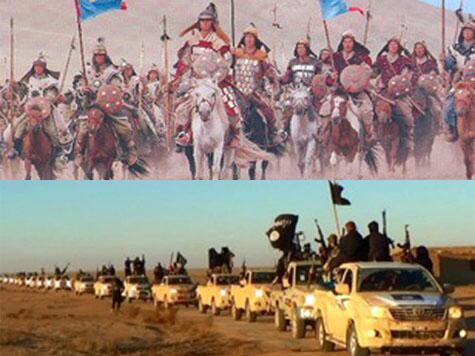
I thought I’d take a break from writing about Tech this week, to focus on where the worlds attention should be–Iraq and Syria, and the existential threat that is besieging the middle-east, a threat we’ve come to call The Islamic State of Iraq and Syria (ISIS).
ISIS may have started of an off-shoot of Al-Qaeda, but they’ve evolved to be much more, they’re so far removed from the Al-Qaeda of Osama Bin Laden they’re starting to look like an reincarnation of an much for terrifying ancient enemy. An enemy that 700 years ago threatened the very existence of Islam in the Middle East more than Israel ever could today. ISIS might be just be the next–Genghis Khan.
You might scoff and laugh, but there are many things strategically and tactically that make ISIS look like a direct descendant of Genghis Khan, and there were many contextual similarities between what’s happening now in the Middle East, and what was happening 700 years ago when the Mongol Horde descended upon it.
The Mongols are the exception to all of history, for example they’re the only people to have invaded Russia in the Winter–and WON!, and they invaded Afghanistan on horseback–and WON!
Historians will glorify them, but we know better. At its peak the Mongol armies controlled more land than anyone before them , but they won their battles in vile, vicious and cunning ways and what they did to their captives is unspeakable. Truthfully the Mongols (and specifically Genghis Khan) were Assholes of the highest order–but they weren’t the only Assholes in history. Alexander, Napoleon, Attila–these were all assholes, it’s just that the Mongols won more wars giving them more opportunities demonstrate their asshole-ness.
Of course the Mongols weren’t just assholes, they were phenomenally great Military Tacticians and Strategist. Almost everything they did (apart from binge drinking) was for the sole purpose of winning wars and battles–even their rapes and terrorizing served to aid them in victory over the enemy (and we’ll soon see how).
But when you dissect as to why the Mongols were so successful–you’ll soon realize it’s the same reason ISIS is so successful, and the similarities between ISIS and the Mongols are too shocking to ignore.
1. They went up against divided forces (treachery)
 Genghis Khan was usually out-numbered and out-gunned by the enemy, but he always made sure he was against divided forces, and he knew how to divide them. It’s a lot easier to fight a battle against superior numbers that are divided than it is to fight against inferior numbers that are united. Take for example his great conquest of the Jin dynasty in China, who had far more soldiers and resources than the Khan, but those Jin soldiers were divided, while his Mongol Horde was United.
Genghis Khan was usually out-numbered and out-gunned by the enemy, but he always made sure he was against divided forces, and he knew how to divide them. It’s a lot easier to fight a battle against superior numbers that are divided than it is to fight against inferior numbers that are united. Take for example his great conquest of the Jin dynasty in China, who had far more soldiers and resources than the Khan, but those Jin soldiers were divided, while his Mongol Horde was United.
You see the Jin were ruled by a tribe called the Jur Chen, who Manchurian and not Chinese. The Jur Chen conquered the Jin from the another tribe called the Khitan, so there was mixture of Jur Chen, Khitan and Ethnic Chinese living together in this part of China–and they hated each other. The Khitan hated the Jur Chen for displacing them, and the ethnic chinese viewed both the Khitan and Jur Chen as foreign barbarians.
So when Genghis Khan shows up, the Khitan defect en-masse to the new Mongol ruler who claims to have the mandate of heaven. Why defend a country ruled by your enemy, when you can be part of the army that defeats it? The defection of the Khitan tribes throws the Jin Emperor off guard, and his cities soon fall one by one, Genghis doesn’t fully defeat the Jin, but he’s sent them reeling from an encounter that the Jin should have easily won if you just looked at the numbers, weapons and resources that were available to both sides. Numbers, weapons and resources don’t win battles–unity wins battles.
This story Jur Chen, Khitan and Chinese is exactly what Iraq is. It’s a mixture of Arab-Sunni, Arab-Shia and Kurdish people, who hate each other, and ISIS uses this to great effect. It’s currently attacking the Arab-Sunni regions of Iraq, and a lot of Iraqi forces are defecting or retreating en-masse, putting up no resistance. Most of the ISIS commanders are believed to be former Iraqi Baathist who served under Saddam Hussein who was overthrown by US forces, the same forces who put a Shia government in charge of the country–sounds very much like how the Khitans were put out of business by the Jur Chen.
But if some of the Arab-Sunni forces were defecting or retreating, why did the Arab-Shia forces retreat? That’s because ISIS used Genghis Khan’s most effective military strategy–terror!!
2. They used Terror
 The Annals of history is littered with stories of terror from Genghis Khan. He would sack entire cities and then instruct the inhabitants of the cities to gather on a plain outside the city walls. Each Mongol soldier was given a battle axe and told to kill a specific number of people, and upon killing them, cut off their right ear as proof (and accounting), a few days after the sacking, troops would be sent back into the city to kill off whoever remained hiding. In this remarkably efficient way, entire cities and cultures were wiped off the map, and the Khan made sure he reputation preceded him in battle.
The Annals of history is littered with stories of terror from Genghis Khan. He would sack entire cities and then instruct the inhabitants of the cities to gather on a plain outside the city walls. Each Mongol soldier was given a battle axe and told to kill a specific number of people, and upon killing them, cut off their right ear as proof (and accounting), a few days after the sacking, troops would be sent back into the city to kill off whoever remained hiding. In this remarkably efficient way, entire cities and cultures were wiped off the map, and the Khan made sure he reputation preceded him in battle.
The Mongols had a policy, surrender to them and you ‘might’ live, but put up a fight and you’ll definitely die. It’s a policy that serves to terrorize future cities more than it is about killing the sacked city.
ISIS uses the exact same tactic, every time the capture an Iraqi battalion, they line them up and start shooting them one by one–they then upload the images to facebook to allow for their reputation to precede them. Iraqi forces, who are just ‘fresh graduate’ soldiers trembled at the terror and decide to flee, in much the same way as armies fled before the Mongols.
ISIS aren’t terrorizing for the sake of terror ala Al-Qaeda, they’re terrorizing for an important military advantage. By allowing their terror to do the work for them, so that when they reach these Iraqi fortifications most of the soldiers have already fled or are too demoralized to put up a good fight. Terror is a military strategy that has nothing to do with religion–although that’s the next similarity that the Khan and ISIS share.
*By killing everyone in a city, you also prevent future up-rising in the rear as your army marches onward.
3. They claimed to have God on their side
 Before Genghis Khan invaded the Jin dynasty of China, The secret history of the Mongols says he went into his tent for 4 days to ‘talk to heaven’. At the end he emerges and claims that God has promised him victory over the Jin (a far larger army than his) and that Heaven was on his side.
Before Genghis Khan invaded the Jin dynasty of China, The secret history of the Mongols says he went into his tent for 4 days to ‘talk to heaven’. At the end he emerges and claims that God has promised him victory over the Jin (a far larger army than his) and that Heaven was on his side.
ISIS did the same thing. Out of nowhere, they suddenly claim that their supreme leader or ‘Caliph’ Abu Bakr al-Baghdadi is a descendant of the Prophet Muhamad. Giving him some legitimacy to the throne. The ‘God on our side’ tactic is effective for many reasons which we won’t go into here, but the similarity doesn’t end there.
Both Genghis Khan and Abu Bakr claimed to have this ‘divine’ intervention much later in their careers. Genghis had conquered other Mongol tribes he got the title of Khan, and he had already destroyed the Tao invading the Jin, just like how Abu Bakr ‘revelation’ of being a descendent of the Prophet came much later in the ISIS story after they had conquered of large areas in Iraq and Syria.
When you claim that God is on your side, suddenly those who oppose you become ‘infidels’ that are obstructing the will of God–and they deserve to be put to death. That’s exactly what the Khan did, and similar to what Abu Bakr is doing in Iraq (see point 2). Of course very few people in the ‘classical’ world took notice of this because something else was in focus–Israel/Palestine, which brings us to point number 4.
4. They took advantage of distractions in the ‘Holy Land’
 When Genghis Khan finishes up with the Jin of China, he turns his attention to the ‘classical world’ of the Middle-East and Europe. He ‘innocently’ wants to open a trade route to the Khwarezmian empire seeing as how he’d just finished conquering 60% of China–there was a lot of stuff in China to trade with.
When Genghis Khan finishes up with the Jin of China, he turns his attention to the ‘classical world’ of the Middle-East and Europe. He ‘innocently’ wants to open a trade route to the Khwarezmian empire seeing as how he’d just finished conquering 60% of China–there was a lot of stuff in China to trade with.
However, Muhammad II of Khwarezm, the Shah of the Empire does “History’s biggest boo-boo” —he pisses of Genghis Khan. Instead of accepting the trade envoys, he kills them, and instead of pleading ignorance (something the Khan allowed the Shah to do), he thrash-talks the greatest military power in history. The revenge of the Khan is swift and absolute, he sacks the cities as he usually does, and wipes out the Khwarezmians off the map.
Indeed the Shah had a great army–possibly the most powerful in classical world, but nowhere near the Military capability of the Khan who just defeated the Jin (who themselves were far superior to the armies of the Shah). No army from the Muslim world came to the Shahs aid, for many reasons, but mostly because they were too busy—with the crusades.
And while the greatest threat to the existence of Islam was banging on the door in Khwarezm–the rest of the Muslim world was instead focused on defending Jerusalem and Holy land–this occurs a second time, when Hulagu Khan, the Grandson of Genghis threatens the Abissid empire. The Abissid Caliph calls on his fellow Muslims (and Christian) neighbors to help him–but they don’t. And Hulagu captures Baghdad without breaking a sweat, were it not for the death of his brother in China, there is no doubt the Mongols would have conquered all of the middle-east including Mecca–in much the same way as the Mongol General Subutai would have conquered all of Europe (including the Vatican) were it not for the death of Ogedai Khan a few decades earlier.
Just look at the great Arab/Persian scientist and mathematicians and you soon realize they start to ‘thin’ out after the 13th century–Andalusia takes the mantle of scienctific achievements after the Abissid empire is gone, but they would pale in comparison to their predecessors.
ISIS has the same advantage. While the rest of world is focused on Israel and the Palestinians, it’s quietly dismantling Iraq and Syria into a state of their design, in sheer numbers alone Syria far outweighs Israel and Palestine as a concern and more people will die at the hands of ISIS than in the hands of Israel–just like FAR more Muslims died at the hands of Genghis Khan than in the Crusades. Of course some of Christians thought Genghis Khan was a good thing since it was distracting the Muslims from defending Jerusalem–they were going to be in for a shock!!
5. The Prester John effect
 The European Christians heard rumours of a Christian king in the east who was attacking the Muslims from their flank. It was welcomed news to them, and rumours persisted about a king called Prester John–Christians must have thought Prester John was Gods wrath onto the Muslims–well they would soon get to meet God’s wrath, and his name wouldn’t be Prestor John, it would be the Genghis Khan.
The European Christians heard rumours of a Christian king in the east who was attacking the Muslims from their flank. It was welcomed news to them, and rumours persisted about a king called Prester John–Christians must have thought Prester John was Gods wrath onto the Muslims–well they would soon get to meet God’s wrath, and his name wouldn’t be Prestor John, it would be the Genghis Khan.
The first Christian army to meet the Mongols doesn’t meet the Mongol Horde of Genghis Khan, rather they meet a ‘scouting force’ led by the his generals Subutai and Jebbe.The Christian Army is from Georgia, and led by a King called George the brilliant–and the Mongols have come at what seems to be an opportune time for George. He’s just finished raising an army for the Pope to fight in the Crusades, and when this army of nearly 90,000 meets a Mongol scouting force of 20,000 all hell breaks loose–for George.
The scouting force under the command of Subutai defeats the Georgian army–and sends them reeling. The Mongols don’t conquer the city, because they’re just a scouting force and their orders were not to conquer. The Mongol pursue further into Europe and defeat every army they see–convincingly–and with a scouting force–until eventually their pulled back by Genghis Khan to finish off some unfinished work in China.
A lot of people today also think ISIS is a ‘good thing’, a powerful force that will unite the Middle East–well Genghis did unite his territories but usually under a remarkably brutal regime, and no one at the time thought it was ‘good thing’.
Genghis Khan wasn’t Prestor John, he probably killed more Christians than the Muslims did–and ISIS is no Prestor John either. They’re rein of terror won’t end unless the world unites to wipe them off. The European Christians made a fatal mistake, the presumed that because the Mongols were attacking Muslims that they had to be Christians–they were not, they were pagans–and they were about as interested in conquering Christians lands as they were in Muslim lands.
Sometimes the enemy of your enemy–is still an enemy. ISIS may be the enemy of Assad, but that doesn’t mean they’re your allies, something Arab-Sunni countries are only now realizing. But just how did the Khans carry out these wars across vast distances–that’s the last thing ISIS and the Mongols have in common.
6. Military Tactics
 The Mongols could move their armies almost instantly, each Mongol soldier had more than just one horse–sometimes as many as 5, and each of these horses carried supplies and they would ride together. The horses were always female for the soldiers to drink their milk, and their armies lived off the land. In this way, a moving Mongol force wouldn’t need a supply line of caravans and ships (like those of the armies it met), but was self-sufficient and could move so quickly, many historians believe the Mongol numbers are greatly exaggerated because no one believed the speed of the Mongol army, that they assumed they were fighting two columns instead of one.
The Mongols could move their armies almost instantly, each Mongol soldier had more than just one horse–sometimes as many as 5, and each of these horses carried supplies and they would ride together. The horses were always female for the soldiers to drink their milk, and their armies lived off the land. In this way, a moving Mongol force wouldn’t need a supply line of caravans and ships (like those of the armies it met), but was self-sufficient and could move so quickly, many historians believe the Mongol numbers are greatly exaggerated because no one believed the speed of the Mongol army, that they assumed they were fighting two columns instead of one.
ISIS may not ride on horses, but they use their modern equivalent–the Toyota Hilux. It moves faster than tanks and ISIS doesn’t need a supply line either, when all they want they get from raided cities.
Secondly, both ISIS and the Mongols also had a vast amount of foreign soldiers. The army of Genghis Khan comprised of Khitans (defected from the Jin), many other steppe people, even Chinese and Arabs. Most of the time they were forced into conscription, but till this day, it remains the only army of conscripts and mercenaries that has stood the test of battle. No other general in history has emulated this aspect of the Mongols–except ISIS.
ISIS also has many foreigners in it’s rank. In early Januray, it was reported that at least 500 French citizens were said to be a part of ISIS, and many other nationalities including Malaysians. Most of them claim to driven by their faith and a desire to defend Islam–but the latest UN report that accuses ISIS of “barbaric acts” of sexual violence and “savage rapes” indicate that they’re no different from the Mongol Horde. Mercenaries always want to get paid, in cash or in women–regardless of their religious creed.
The final Military tactic that ISIS and the Mongols shared was stolen weapons. After Genghis Khan conquers the Jin, he acquires state-of-the-art seige weaponry from the Chinese, and uses these weapons against the classical world. Most Europeans who’ve never seen gun-powder before, are amazed at the Mongol ballistic weaponry that inspires awe as much as it inflict damage. In much the same way, ISIS has modern weaponry that it stole from raided cities. The Guardian reports that “Much of those heavy weapons, including tanks, humvees, troop carriers and artillery pieces were seized by Isis when the Iraqi Army abandoned all its bases in the Arab north…The enormous arsenal has given Isis an added potency”. Most of these weapons were supplied to the Iraqis by the US, and ISIS unleashing these made in America bombs on the Kurds, is no different than Hulagu Khan unleashing Made in China seige weaponry on Baghdad shortly before it’s fall.
The speed of their movement, the way their numbers swell with mercenaries, the stolen weaponry whose potency exceeds anything their enemies can offer–make ISIS look exactly like the modern day Mongols. These similar tactics, executed almost to perfection, by troops united in their ideology, give ISIS the upper hand not just against the Kurds or Iraqis, but quite possibly against all the countries in the region–after all Genghis wasn’t content with ‘just’ China.
Conclusion
It was said that at the time of Genghis Khan, a virgin could walk with a pot of gold on her head through the entire empire unharmed–seeing as how the Mongols controlled most of the known world, you might think that was a good thing.
It means is that there were no bandits who would steal or rape–but why weren’t there any bandits? The answer is quite simple, all the stealing and raping was being done by the Mongol Horde–and quite frankly they didn’t like competition–no government likes competition—not even the Mongols.
The Mongols always viewed themselves as bringing peace to the world, and in some ways they did–but in many ways, they didn’t. They’re sacking of cities with death tolls that were in the millions meant that even if you remove the relatively small amounts of banditry on the Silk road–it was still histories most brutal war. After you adjust for the worlds population at the time, the Mongol horde killed more people than World War 2 (as a percentage of the worlds population)–and unlike WW2 the Mongols used battle axes and arrows instead of guns and bombs.
One of the reasons the Middle-East is such a mess now, is probably because of Genghis Khan. When his Grandson Hulagu conquers Baghdad, historians write that the rivers were red with the blood of the scientist and poets, and that waters ran black from the ink of great manuscripts. Prior to the Mongol invasions the Islamic world was clearly ahead of Christian Europe in terms of scientific, military and even economic progress–that advantage is wiped out, and Europe is then left alone to progress (because China has also been suppressed).
I’m not saying ISIS will do to the Middle-East this sort of damage, but the damage is clear, and unless the world unites to oppose this force–we’ll see a great catastrophe identical to the on our ancestors saw 700 years ago–isn’t it appropriate then that they named that catastrophe the Vengeance of God?!
I think it’s only appropriate that we end with a quote from the Khan himself.
[box icon=”quote”]
“I am the punishment of God…If you had not committed great sins, God would not have sent a punishment like me upon you.” – Genghis Khan
I hope you enjoyed the article, it took me a long time to write the nearly 3000 words that made it. At one point the article was 4500 words long….of course I’m no expert in the Middle East or even in the Mongols, if you spot an error, let me know in the comments and I’ll fix it as soon as I can.
If you’re interested in the history of the Mongols, A podcast by Dan Carlin called Hardcore history has an entire series on the Mongols called Wrath of the Khans and it’s a fascinating listen if you have about 7 hours to spare–but it’s the best 7 hour history lesson you’re ever have. Also the video below from the ever awesome guys at crashcourse is also a great starting point:
Image of terror courtesy of Carlos Arturo Flores
Image of Palestinian children courtesy of Hossam el-Hamalawy
nice..make sense..
Very well written article. I thought you’ll leave out the part of the sacking of Baghdad, but you got that covered also. Yes the golden years of Islamic renaissance ended when Baghdad was burned to the ground by the Mongol Horde. Later Islamic science, poetry and technology picked up once more albeit briefly in Andalusia, Spain.
Thanks for reading 🙂
Sorry But Ghenghis khan and ISIS couldn’t be more different, first of all the Mongols were empire builders they only cared about their State and had some sort of diplomacy Unlike ISIS which is ALL OUT OF FUCKS IT HAS NONE TO GIVE Seriously ISIS is fighting on 5 fronts at once against numerous enemies and is taking all those Burdens upon themselves while they don’t have the Strength to completely Counter it Had they made peace with the Kurds and the Opposition and had they focused all of their Strength against Assad and the Shia Government They might haven Taken Baghdad and Damascus By now
I’m sorry but I cannot take what you’ve written seriously, half the things you say are either different of the opposite from what the crash course video you posted says. Beside that you could make a case for almost any ancient world conqueror as being in relation to to ISIS. Besides that where our your other sources, are you credible,and were you unbiased? Further more I know middle schools level kids that are better writers then you, and they know it (really the number of mistakes is sort of embarrassing). Also I don’t no that much about ISIS but the Mongols are sort of like that phrase in like a lion and out like a lamb, as far as their imperialism goes, they were pretty good. They often took over without violence, they promoted religious diversity, after Genghis Khan went on his rapes and set his examples he would not abandon and neglect his captured lands like the British imperialism of Africa. Nope, he protected and promoted the poorer regions, he took care of problems that are plaguing America, like the differences between the rich and poor. also he did help move science and culture around, aiding in seeding Eurasia with all sorts of possibilities. I’m just saying as far as it goes, the Mongols were significantly intelligent and protective, with tolerance towards diversity and religion as well as a strong sense of pride and family as they lost many of their lands and conquest do to returning home to mourn their losses. As for the record Genghis Khan is sort of a progressive kick-start for the world while ISIS’s rebuilding of Syria and Iraq seem to be a intolerant push backwards. In the end if ISIS conquers the planet, I’d hate to be you.
Thanks for the comment.
Well first off, the Mongols taking over without violence, is because people were afraid of what they did when they actually DID use violence. It wasn’t as though people willingly wanted to be conquered by Genghis–it was simply they were afraid of dying violently at the hands of a Mongol with a BATTLE AXE, chopping off their heads. Go read what Mongols would do to the inhabitants (innocent bystanders) of a city after it was sieged and then tell me what City wouldn’t give up the instant the Mongols arrived.
And Yes, Genghis Khan and Mongols in general were quite religiously tolerant, but people forget that the a lot of Polytheist like the Mongols were VERY religiously tolerant by Monotheistic standards. The Mongols believed in their Gods and never expected anyone else to believe in them, simply because at the time Gods were tied to their locality, and people from other localities weren’t expected to worship Gods from elsewhere. This of course in stark contradiction to Monotheist who usually expected everyone to worship their God–and hence the religiously intolerant. The only thing Genghis Khan didn’t like was people not paying their taxes–other than that they could worship anyone they damn pleased.
And in terms of Genghis being intelligent–I fully agree. most Military Historians accept him (instead of Alexander or Napoleon) as the greatest Military General in all of human history–and you don’t get there by being stupid.
But he wasn’t progressive.At least not a progressive kick-starter of the world. He destroyed much of the Abissid empire (well technically his grandson Hulagu)–but it was said that the “Rivers ran black from the ink of the manuscripts” that they threw into the river. Which was probably a HUGE amount of knowledge at the time because the Abissids led the world in Science and Technology (not counting contemporary China of course)
In the end though if ISIS conquers the planet–I’d hate to be anyone. But they won’t–and in most cases that’s not their real purpose either. I use to think that ISIS was really bad, but after a while I realize their just that regions response to the current situation. The real solution for Iraq would be a 3-country solution with the Kurds, Shia and Sunnis each getting their piece of the pie–once that happens all the support ISIS currently gets will dwindle, and we’ll move on to something else. ISIS is sort of the Sunni Army, in response to Peshmerga forces for the Kurds and the Iraqi army consisting mostly of Shia’s–once the war ends, there’s no need for the army.
Yep agree!
[…] Article: What Do ISIS and Genghis Khan have in Common Opinion: ISIS’s strategy remains seriously flawed – February 13, 2015 […]
This article has nailed it!
This is article is Haram! ISIS is lunatics muslims thats all there is.
nice crash course. It would be interesting to compare Genghis Khan to the current / recent day imperialists..